![]() ficci admin
ficci admin
![]() August 24, 2023
August 24, 2023
![]() (0) Comment
(0) Comment
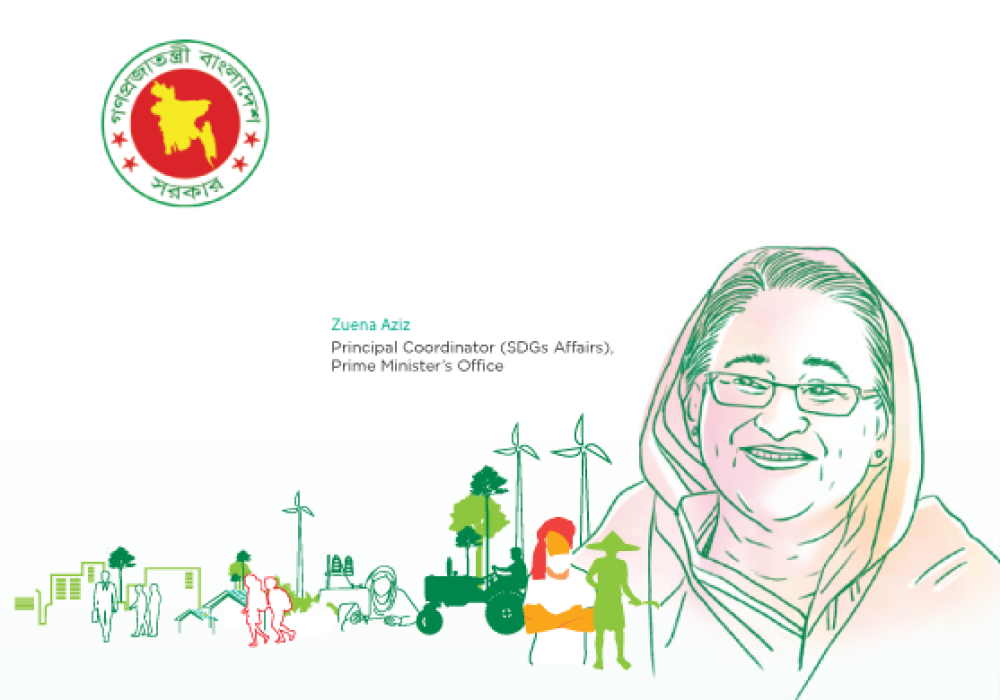
![]() ficci admin
ficci admin
![]() August 24, 2023
August 24, 2023
![]() (0) Comment
(0) Comment
Backgrounb
On September 25, 2015, at the 70th UNGA, the final report on the Sustainable Development Goals (SDGs) titled “Transforming Our World: 2030 Agenda for Sustainable Development” was adopted on the basis of long discussions and global consensus among all stakeholders in the most inclusive process in the history of the United Nations. It has set 17 goals backed up by 169 targets for the world’s future through 2030 to eradicate poverty, end hunger, ensure health and education, bring gender equality and empower women, eliminate inequality, and combat climate change and its effects. Agenda 2030 provides a framework for global cooperation to address the three dimensions of sustainable development viz. social inclusion, economic development, and environmental protection. The SDGs are also based on five cardinal principles, namely: (a) People, (b) Planet, (c) Prosperity, (d) Peace, and (e) Partnership. The motto of the SDGs is to ensure leave no one behind, i.e., building effective, accountable and inclusive institutions at all levels to promote a peaceful and inclusive society in sustainable development.
Bangladesh's Experience In Implementing The MDGs, The First Global Goals
According to the United Nations "Millennium Declaration, 2000", Bangladesh has demonstrated outstanding success in achieving the 8 goals and 21 targets adopted for implementation from 2001 to 2015. Bangladesh has met several of the MDG targets ahead of the stipulated period, such as: reducing the headcount poverty and poverty gap ratio, reducing the prevalence of underweight children, achieving gender parity in primary and secondary education, reducing under-five mortality, availability of antiretroviral drugs—reducing HIV transmission, children sleeping under insecticide-treated mosquito nets, tuberculosis cure rates under DOTS etc. In addition, Bangladesh made significant progress in increasing primary school enrolment, reducing infant and maternal mortality, increasing immunization coverage, and reducing the incidence of communicable diseases. As a result, Hon’ble Prime Minister Sheikh Hasina was awarded several awards and honours from various international organizations including the United Nations.
Actions Taken by Bangladesh to Implement the SDGs
People’s empowerment and development, the Hon'ble Prime Minister Sheikh Hasina's philosophy :
At the 66th session of the United Nations General Assembly in 2011, the Hon'ble Prime Minister of Bangladesh presented a new peace model titled “People’s empowerment and a peace-centric development model” based on her life-long experience in politics spanning half-a-century. Focusing on sustainable democracy as a fundamental instrument of development, she presented six mutually reinforcing peace factors, namely: (a) eradication of poverty and hunger, (b) reduction of inequality, (c) mitigation of deprivation, (d) inclusion of the excluded people, (e) acceleration of human development, and (f) elimination of terrorism. Later, the Prime Minister's proposal was unanimously adopted as a resolution at the UN summit in the category of "People's Empowerment and Development". All the issues of the resolution adopted based on the model of the philosophy of Hon'ble Prime Minister Sheikh Hasina are present in the SDGs. Her main target of development agenda is the people, and so are the SDGs. The Government has thus incorporated the SDGs into its own development agenda to address the challenges of social inclusion, economic development and environmental protection. With a view to addressing the “leave no one behind” aspiration of the SDGs, the government has adopted special programmes for the homeless and landless, marginalized
Political Commitment :
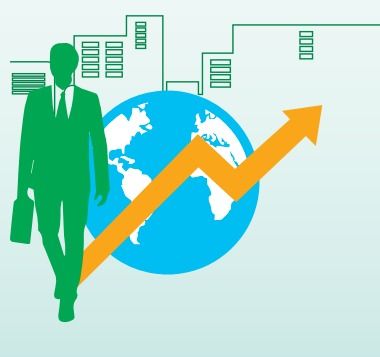 Under the direct guidance and supervision of the Father of the Nation Bangabandhu Sheikh Mujibur Rahman, the Constitution of the People's Republic of Bangladesh drafted in 1972, has pledged to ensure fundamental human rights, respect for the dignity and worth of human beings, and effective participation of the people through elected representatives. Hence, many of the fundamental principles of sustainable development have long been enshrined in our constitution. It should be noted that in the speech given at the United Nations on September 25, 1974, Father of the Nation mentioned, “The Bengali nation is dedicated to building such a world order in which will be reflected people’s desire for achieving peace and justice.” This statement of Bangabandhu is directly reflected in the SDG-16. In addition, in the speech, he emphasized on eradicating poverty (SDG 1), eliminating hunger (SDG 2), reducing inequality (SDG 10), good health (SDG 3), education (SDG 4), solving the problem of unemployment (SDG 8), emphasizing building equitable economic systems (SDG 16), addressing natural disasters (SDGs 1, 11, 13) and recognizing interdependence and concerted efforts to solve problems (SDG 17). So, it can be seen that almost.all of Bangabandhu's thematic statements are present in the SDGs.
Under the direct guidance and supervision of the Father of the Nation Bangabandhu Sheikh Mujibur Rahman, the Constitution of the People's Republic of Bangladesh drafted in 1972, has pledged to ensure fundamental human rights, respect for the dignity and worth of human beings, and effective participation of the people through elected representatives. Hence, many of the fundamental principles of sustainable development have long been enshrined in our constitution. It should be noted that in the speech given at the United Nations on September 25, 1974, Father of the Nation mentioned, “The Bengali nation is dedicated to building such a world order in which will be reflected people’s desire for achieving peace and justice.” This statement of Bangabandhu is directly reflected in the SDG-16. In addition, in the speech, he emphasized on eradicating poverty (SDG 1), eliminating hunger (SDG 2), reducing inequality (SDG 10), good health (SDG 3), education (SDG 4), solving the problem of unemployment (SDG 8), emphasizing building equitable economic systems (SDG 16), addressing natural disasters (SDGs 1, 11, 13) and recognizing interdependence and concerted efforts to solve problems (SDG 17). So, it can be seen that almost.all of Bangabandhu's thematic statements are present in the SDGs.
Alignment of SDGs with the National Development Strategy:
Following the successful implementation of the MDGs, the Government is committed to achieving the SDGs announced by the UN from the outset. To fully implement the SDGs, Bangladesh needs to formulate and implement three successive Five-Year Plans. During the formulation of the Seventh Five Year Plan (2016-2020), the Government of Bangladesh was also involved in the process of preparing the Post-2015 Development Agenda. Bangladesh submitted a framework proposal of 11 goals, 58 targets and 241 indicators to the United Nations under the kind guidance of Hon'ble Prime Minister Sheikh Hasina by organizing four Divisional level and one national level workshops. Among the 17 goals finally adopted by the United Nations, 10 goals proposed by Bangladesh conversed with them. For this reason, without wasting time, Bangladesh was able to align its seventh Five-Year Plan with most of the SDGs. Later, “Bangladesh Delta Plan 2100” also integrated Agenda 2030. The ongoing Eighth Five Year Plan (2021-2025) has been aligned with all the SDGs as well. Among the 104 indicators selected to monitor whether the Eighth Five-Year Plan is being properly implemented, 66 are solely SDG indicators. Hence, if positive results are found in the mid-term reviews of the Eighth Five-Year Plan, it will mean that we are on the right track in implementing the SDGs.
Formation of SDGs Implementation and Review Committee:
Since the SDGs are interrelated and multiple Ministries/Divisions are involved in the implementation of a specific goal, the post of Principal Coordinator for SDGs has been created at the Prime Minister's Office for overall coordination. The SDGs Implementation and Review Committee has been constituted comprising the Secretaries of the most relevant 25 Ministries/Divisions convened by the Principal Coordinator. The Member of General Economics Divisions (GED) of Bangladesh Planning Commission is serving as the member secretary of the committee. Presently, UN Resident Representative, President of FBCCI, Director General of NGO Affairs Bureau, representatives of CPD, PKSF and Aspire to Innovate (A2i) are also invited to the said committee meeting.
Adopting a “Whole of the Society Approach” to SDGs Implementation :
The Government of Bangladesh has adopted the “Whole of the Society Approach” involving, NGOs, INGOs, civil society, development partners, private institutions, businessmen, academics, professional organizations, local government institutions, parliamentarians and other relevant stakeholders to implement the SDGs. On 16th May 2019, from the Cabinet Division, the SDG implementation and coordination committees have been formed at the Division, District and Upazila levels with representatives of various stakeholders.
SDG Mapping And Goal-based Coordinating Ministries:
The Government has identified the Ministries/Divisions as Lead, Co-Lead and Associate Ministries according to their level of responsibilities to implement the goals and targets of Agenda 2030. Also, on 30th September 2019, the goal-wise coordinating Ministries/Divisions have been designated from the Prime Minister's Office. Seventeen Coordinating Ministries for 17 goals will organize workshops for target-based progress review of SDGs involving relevant stakeholders including Lead, Co-Lead and Associate Ministries, Development Partners, NGOs, CSOs. They will identify challenges and devise ways to overcome them, and develop objective-based reports encouraging best practices and innovation.
Formulation of National Action Plan for Achieving SDGs :
Following SDGs Mapping, Lead Ministries in consultation with Co-Lead and Associate Ministries have prepared the “National Action Plan to Achieve SDGs” wherein new projects, programmes and necessary policies to achieve SDG targets in five years in line with Seventh Five-Year Plan has been highlighted. The National Action Plan has already been reviewed by organizing several workshops. A revised National Action Plan in the light of the Eighth Five-Year Plan will be finalized soon.
Analysis of Data Gaps in SDG Implementation Monitoring:
Data is needed to monitor whether SDGs implementation is being carried out properly or not. The Government has reviewed the data collection systems of existing surveys, censuses, national accounts and statistical agencies and published the “Data Gap Analysis for SDGs Monitoring”. The 2017 analysis found that data for 70 indicators were readily available, and 108 indicators were partially available. At present, however, it is possible to obtain information on 176 indicators of the SDGs in our country.
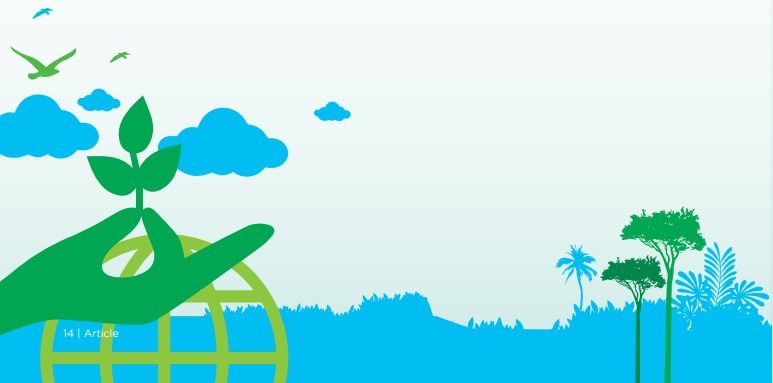
Formulation of SDG Monitoring and Evaluation Framework:
In 2018, Bangladesh Government formulated and implemented a results-based monitoring and evaluation framework (where we have to go from where) to review the implementation progress of the goals and targets of Agenda 2030. Here, three milestone targets (2020, 2025, 2030) are determined in accordance with the five-year planning cycles. Based on the framework, the General Economics Division (GED) is preparing a report on Bangladesh's progress in achieving the SDGs in every two years. A revised version of the Monitoring and Evaluation Framework was released in 2020 as the new framework for the Eighth Five-Year Plan was finalized at the end of the Seventh Five-Year Plan
Launch of SDG Tracker for Results-Based Monitoring :
A data repository and innovative SDG Tracker (sdg.gov.bd) has been launched to monitor the implementation of SDGs as an online version of the Monitoring and Evaluation Framework of SDGs. The Hon'ble Prime Minister inaugurated it at a side event during the 72nd session of the UNGA in September 2017. From the general public to policy makers, everyone can find out where we stand on any indicator online from anywhere, download data and generate required reports. The statistics and Informatics Division (SID) has already provided necessary training to SDG focal and alternate focal points officers, data providers, data approvers, and data authenticators of Ministries /Divisions. Currently, 92 organizations from 43 ministries are connected to the SDGs Tracker.
Financing Strategy of SDGs:
The Government conducted a study to determine the financial needs for SDGs implementation, which revealed that an additional estimated investment of US$ 928.48 billion is required from 2017 to 2030 at constant prices of the 2015-16 fiscal year. The annual average financing requirement during the period under review is US$ 66.32 billion. Five possible sources of deficit financing are recommended: (a) private sector financing (42%), (b) public sector financing (34%), (c) public-private partnerships (6%), (d) external sector financing (15 %), and (e) NGO funding (4%)
Participation in Voluntary National Reviews (VNRs) :
On 17 July 2017, Bangladesh participated in the first Voluntary National Reviews of the SDGs along with 42 other countries at the UN High-Level Political Forum on Sustainable Development. In that year, the implementation of 7 goals (Goals 1, 2, 3, 5, 9, 14, and 17) of Agenda 2030 was reviewed. Later, on 13 July 2020, Bangladesh along with 46 other countries participated in the VNRs process for the acceptable data on the indicators of SDGs. To ensure regular, updated and reliable information in the SDG Tracker, the latest data status of each Ministry/ Division/ Department/ Organization is regularly placed and discussed in the NDCC meeting, chaired by the Secretary of the Statistics and Informatics Division (SID).second time. Then, all goals were then taken into consideration for review. The Voluntary National Reviews Document was prepared in consultation with all relevant stakeholders of the SDGs
Organization of National SDGs Implementation Review (SIR) Conference :
The first National Conference on SDG Implementation Review (SIR), jointly organized by the Governance Innovation Unit, Prime Minister's Office and General Economics Division was held on July 4-6, 2018. About 2000 representatives of various stakeholders including government, NGO, CSO, private sector, and development partners participated in it. At the national conference, 43 lead Ministries/Divisions highlighted their SDGs implementation progress and presented future action plans. The report released at the conference identified successes, and implementation challenges and provided directions for the way forward. In continuation of this, the second SIR conference was held on 16-18 May 2022. The hon'ble Prime Minister attended the inaugural session as the Chief Guest and gave some instructions to accelerate the implementation of SDGs. In the second conference, unlike the 1st one, all the Divisional Commissioners presented various SDGs localization activities in their respective jurisdictions. Various Ministries/Departments presented their activities undertaken against the SDG Action Plan. Representatives of the private sector, development partners, NGOs and civil society also presented their positions.
Localization of Sustainable Development Goals in Bangladesh:
The Government of Bangladesh has prepared a priority list for localizing SDGs at the District and Upazila levels. The priority 40 indicators (39+1) were approved in the cabinet meeting held on 3rd December 2018. It is to be noted that one additional indicator has been proposed to be adopted from the respective District/Upazila in which the respective District/Upazila is relatively backward. GIU has provided training for trainers in all administrative Divisions and the trained officials have imparted training to the concerned officials at District and Upazila levels. Later, after finalizing the Upazila Action Plan, the District Action Plan was finalized. In joint consultation and supervision of GED and GIU, Natore District Action Plan for implementation of SDGs has been formulated and published, which is recommended to other districts to follow.
Formation of National Data Coordination Committee (NDCC):
The National Data Coordination Committee (NDCC) has been constituted with representatives from various data-providing organizations to prepare and provide standardized, up-to-date and sectors. To achieve different goals of SDGs, governments must take the lead in living up to their pledges. At the same time, the private sector should spread their hand with new initiatives, new ideas and new technologies to the government for the sake of the country and the betterment of the people.
• SDGs implementation will require a much larger amount and more varied sources of financial resources than it was for meeting the Millennium Development Goals (MDGs). Surely, national governments will continue to have the primary responsibility for financing the SDGs through their own development plans and budget, but it will not be enough, given the wider breadth and width of the scope of the SDGs. To fully realize the SDGs, all parties—government, civil society and the private sector—must have a shared responsibility.
• Private sector has been the driver of economic growth in Bangladesh like many other developing countries. A large number of targets of SDGs are related to growth, employment, and the delivery of key services such as education and health, which could not be achieved without the active participation of the private sector. In order to achieve these goals through greater involvement of the private sector, there has to be a framework of how these two actors can work in tandem. In some cases, particularly in protecting the environment, the private sector requires incentives from the government to remain competitive in the world market.
• In order to make the private sector more ‘responsible’ in production and consumption, an efficient mixture of laws and incentives should be in place. We can categorize the modalities of engagement of the private sector in achieving the SDGs into five groups: (a) Continue the existing contributions of the private sector, (b) Engaging the private sector through incentive/disincentive mechanism, (c) Engaging the private sector through laws, (d) Corporate Social Responsibility (CSR), and (e) Developing business cases through innovation and research & development
. • With regard to SDGs implementation, the Government of Bangladesh expects the private sector will create more employment opportunities, which ensures greater social inclusion and environmental protections. They will accept fairer tax regimes, work towards more stable socioeconomic contexts for commerce to flourish both within and between countries. Private sector leadership will concentrate on new mechanisms for co-financing sustainable development innovations, focusing more on long term sustainability rather than solely short-term profits. Cultivating more resilient agriculture systems with efficient market, they should focus on new methods of sustainable crops and products. They should work with public health
Involvement of Youth in SDGs Implementation:
There is no alternative to ensure the participation of youth, the most creative and dynamic segment of the country's population, at local, national and international levels in achieving the SDGs. For this, a skilled youth community with high human and moral consciousness and rich in advanced education and training is essential. If the young men and women of the country are developed in that way, their overall development and empowerment will be smooth. To this end, the GIU of the PMO organized the first workshop with the participation of about 200 youth and youth organizers as an initiative to involve the youth in the implementation of the SDGs under the theme “SDGs for the Youth, by the Youth”. Following GIU's concept paper, the Ministry of Education, Ministry of Youth & Sports, and Ministry of Cultural Affairs organized three similar workshops.
Enhancing the Efficiency of Public Administration to Achieve the SDGs :
On April 10, 2018, the project titled "Enhancing the efficiency of public administration to achieve sustainable development goals" presented by the GIU was approved by the ECNEC. Through this five-year fully government-funded project, Prime Minister’s Fellowship has been awarded to 94 persons for PhD course and 220 persons for Master’s degree. Moreover, the SDGs module has been included in the foundation training course of the newly recruited government officials.
Launch of My Constituency Data Platform :
“My Constituency Data Platform” has been launched to ensure progress monitoring of each constituency as a tool for SDGs localization. The platform enables parliamentarians to monitor development progress and take data-based decisions for inclusive development planning and priorities in their respective constituencies. It is a web and mobile apps-based data platform, where data on 86 indicators across 10 themes are currently available. Hon’ble Members of Parliament can now also compare the progress of their constituencies with other constituencies.
Role of the private sector in SDGs implementation :
sectors to develop cheaper and more appropriate services, especially for maternal and child health. Also, they have to work with the public sector to ensure the supply of appropriate skills and education. To ensure gender equality in companies, they will open more opportunities for female leadership with proper working environment. They can ensure corporate commitment to promote safe and clean water with hygienic sanitation. The Government will provide incentives through tax and affordable pricing structure to mobilize alternative energy for the private sector. We need massive private sector innovation; focusing on both short and long-term impacts, especially in extractive industries, but also on production, transportation and waste recycling methods in all sectors.
• As the apex trade body, FBCCI is encouraging the industrial and commercial organizations of the country to formulate and implement plans to increase efficiency through innovative and technological development in line with the SDGs. FBCCI and GIU of PMO jointly organized a meeting on 1st July 2018 to identify the role of the private sector in achieving the SDGs. The meeting divided the SDG targets into several thematic issues and accordingly formulated recommendations on the role of the private sector in achieving the targets. Following the first meeting, another large-scale meeting was organized on 2nd November 2019. In addition, with the aim of understanding how business organizations can be involved in the implementation of SDGs, a specific questionnaire has been prepared by the Prime Minister's Office, which has been sent to collect data through individual sector chambers/associations under the supervision of FBCCI.
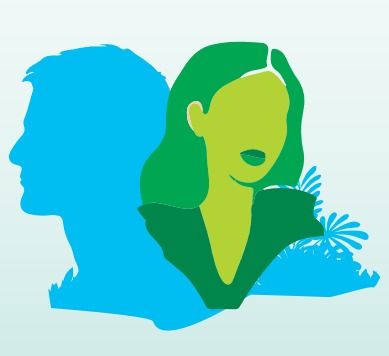 • In 2021, 47 factories of the Bangladesh Garment Manufacturers and Exporters Association (BGMEA) voluntarily produced a report highlighting the impact of the garment industries on the respective SDGs. The report shows how the garment industry is contributing not only to economic development, but also to the achievement of the SDGs: it provides employment, supports healthcare for the working class, invests in improving workforce skills, recycles resources, and increasingly uses renewable energy. Towards the journey of sustainability, BGMEA has joined the UNFCCC’s Fashion Industry Charter for Climate Action and pledged to reduce GHGs emission of the industry by 30% within 2030. It has pledged to the “Green Button Initiative” of the German government. It has been implementing Partner of the IFC Partnership for Cleaner Textile. It is the 1st Association in Bangladesh to Publish Sustainability Report in 2020. This initiative by BGMEA will encourage other federations /chambers/associations to come forward and report their social, economic and environmental impacts
• In 2021, 47 factories of the Bangladesh Garment Manufacturers and Exporters Association (BGMEA) voluntarily produced a report highlighting the impact of the garment industries on the respective SDGs. The report shows how the garment industry is contributing not only to economic development, but also to the achievement of the SDGs: it provides employment, supports healthcare for the working class, invests in improving workforce skills, recycles resources, and increasingly uses renewable energy. Towards the journey of sustainability, BGMEA has joined the UNFCCC’s Fashion Industry Charter for Climate Action and pledged to reduce GHGs emission of the industry by 30% within 2030. It has pledged to the “Green Button Initiative” of the German government. It has been implementing Partner of the IFC Partnership for Cleaner Textile. It is the 1st Association in Bangladesh to Publish Sustainability Report in 2020. This initiative by BGMEA will encourage other federations /chambers/associations to come forward and report their social, economic and environmental impacts
SDG Implementation Progress of Bangladesh
Bangladesh was in a relatively good position to achieve some of the targets of several SDGs before the onset of the global pandemic of Covid-19. The pace of poverty and hunger reduction was desirable; the poverty rate fell to 20.5 per cent and the prevalence of malnutrition decreased to 14.7 per cent. According to the latest World Bank estimates, the proportion of Bangladesh's population living below the international poverty line (per capita daily income of 1.90 PPP dollars) was 12.5 per cent and 11.9 per cent in 2020 and 2021, respectively. Significant progress has been made in reducing stunting among children under five, from 60 per cent in 1996-97 to 28 per cent in 2019
Significant progress has been made in the health sector: Neonatal mortality has decreased to 15 per thousand, child mortality rate has decreased to 28 per thousand, maternal mortality ratio has decreased to 163 mothers per 100,000 births, the presence of skilled health workers during childbirth has increased to 75. 3 per cent. According to the 2019 estimates, the rate of HIV infection is 0.015 per 1000 people at the national level. Bangladesh has successfully achieved continuous progress in the fight against tuberculosis. Notable progress in the education sector includes raising the primary education completion rate to 83 per cent, achieving gender parity at the primary and secondary levels, providing nearly 80 per cent of teachers with the necessary training, and raising the adult literacy rate to 76 per cent
The ratio of elected women seats in the National Parliament and local government is 21 per cent and 23 per cent respectively. Bangladesh ranks ninth in the world in terms of women's empowerment in politics. 98.5 per cent of household members in the country have access to safe water from better sources. Comparatively the greatest progress can be seen in the power sector; 100 per cent of the people have come under the electricity facility. The manufacturing sector's value addition to the country's GDP has increased at a significant rate. The government has been considering the construction of resilient infrastructure on a priority basis. With a view to reducing inequality, the government has increased the number of beneficiaries and allowances in the social safety net programmes. In line with the “Sendai Framework for Disaster Risk Reduction 2015-2030” and other international protocols signed, the Government has formulated the “Bangladesh Disaster Risk Reduction Strategy (2016-2030)”. Bangladesh has drafted the “Mujib Climate Prosperity Plan 2030”, which will leverage the financing of the 8th FYP, “Vision 2041” and “Bangladesh Delta Plan 2100” to unlock a pathway for a fast-tracked delivery of the SDGs by 2030 and GDP per capita growth commensurate to upper-middle-income status
Bangladesh's International Recognition of SDG Implementation
The Sustainable Development Solutions Network (SDSN) founded under the auspices of the UN Secretary General and led by renowned American economist Professor Jeffrey David Sachs, has been preparing independent evaluation reports on the implementation of the SDGs since 2017. In the first assessment of 157 countries, Bangladesh was ranked 120th in SDGs implementation and the index score was 56.2 (out of 100). According to the latest report of 2022, the global position of Bangladesh is 104th and the index score is 64.2.
SDSN's 2021 report notes that the global pandemic is a major blow to sustainable development; for the first time since the adoption of the SDGs in 2015, the global average SDG index value declined compared to the previous year. But Bangladesh’s success is due to the policy adopted by the Hon’ble Prime Minister to deal with the disaster of Covid-19 by keeping lives and livelihoods intact. Bangladesh has been able to maintain its index score and position similar to its previous years (2020 and 2021) even in the midst of Covid-19. According to the report, Bangladesh is one of the three countries that have made the best progress in the global ranking in the last five years. Therefore, on 20th September 2021 at the 9th International Conference on Sustainable Development, Prof. Jeffrey Sachs presented the “SDG Progress Award” to the Hon’ble Prime Minister Sheikh Hasina. At the event, Professor Sachs mentioned that Bangladesh came first in the world in most SDGs progress between 2015 and 2020

Conclusion
The Sustainable Development Goals are broad, interrelated and interdependent. Some goals are preconditions for the implementation of other goals, some goals will accelerate the implementation of other goals, some goals, however, may also create disruptions in the achievement of others. Hence there is no alternative to adopt a planned development strategy. If the SDGs can be localized to the local realities in coordination with national-level plans and strategies that are well thought out, more benefits can be achieved cost-effectively, benefiting the entire country. It will be possible to build a developed, happy and prosperous country free from hunger and poverty by 2041 by developing a skilled workforce with an emphasis on quality education and involving the general public at all levels of the development agenda. In this, the global development agenda will serve as a complement to the national-level development agenda. Hon'ble Prime Minister Sheikh Hasina is leading the country in the desired planned roadmap to build the golden Bangladesh to fulfil the dream of the Father of the Nation Bangabandhu Sheikh Mujibur Rahman.
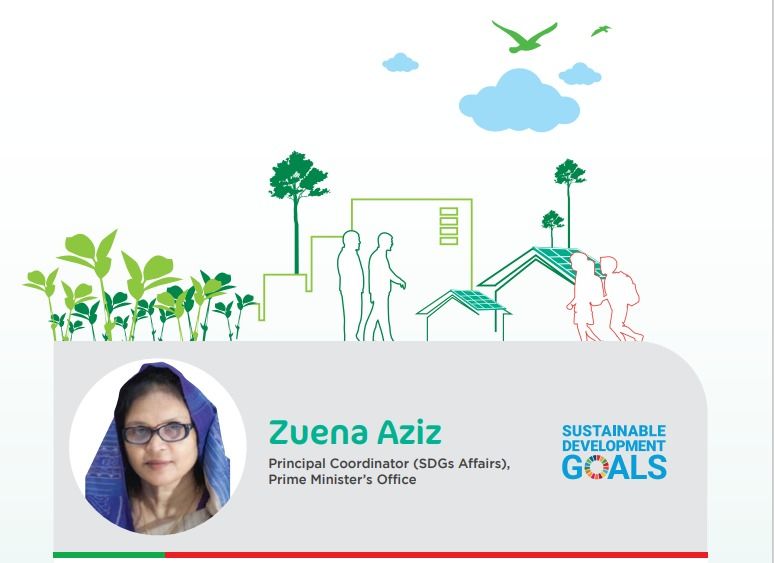
Zuena Aziz has been appointed as the Principal Coordinator for Sustainable Development Goals (SDGs) at the Prime Minister's Office (PMO) of the Government of Bangladesh. Zuena Aziz is a 1984 batch BCS (Administration) cadre officer. She joined the Civil Service of Bangladesh in 1986 and performed her responsibilities in different capacities at the field-level administration and at the Secretariat. Before joining her current responsibility, she was the Senior Secretary at the Ministry of Social Welfare. Prior to that, she served as the Secretary of the ICT Division. She also served as the Member (Secretary) of Bangladesh Planning Commission